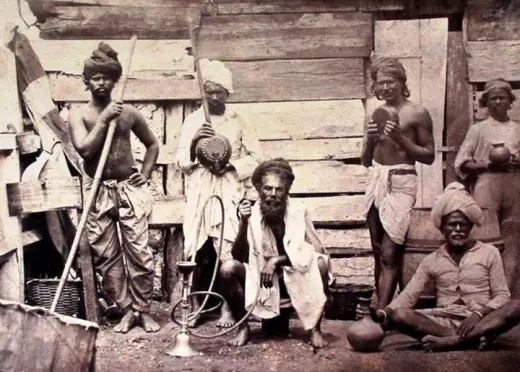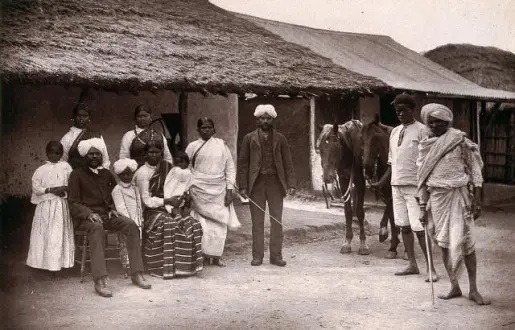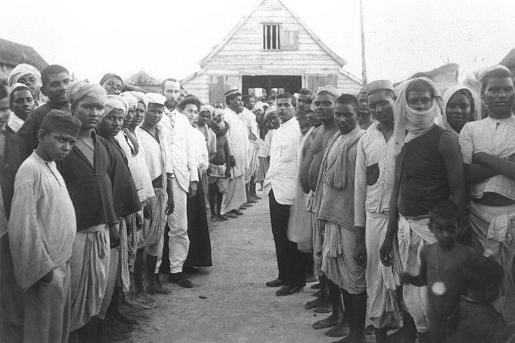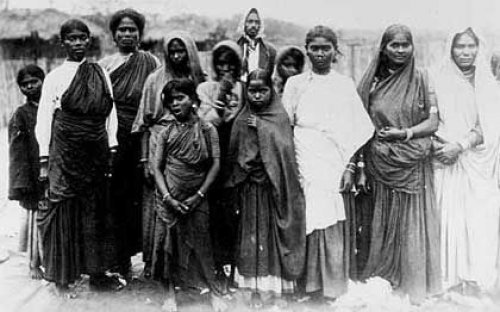
When the British took over East Africa, the people who spoke Cutchi were already there. They were mostly traders, and they spoke for about twenty different Muslim or Hindu groups.
By African Booth
Who Are The Indian Diaspora In Africa?
Asians in East Africa came to live there after the British took over India and made it part of the British Empire. The British taking control of India started the Indian Diaspora, which led to Indians being sent to far-flung parts of the British Empire to work as slaves. Indians who were bought by the British and forced to work on the East African railway in the late 1800s are called “bonded labor.” At the beginning of the 20th century, a lot of traders from Gujarat, an Indian state in the west, moved to East Africa and joined other Indian traders who were already living in Zanzibar.
There is a lot of evidence that Vasco da Gama met a Muslim ship captain who spoke Cutchi and showed him the way to India in 1468
During the time of the Indian Diaspora, Indians in East Africa kept close ties to their home country, just as they did everywhere else. Even though there are more Indians in East Africa now because the British colonized the area, people have been traveling between East Africa and India since the 1500s. For example, there is a lot of evidence that Vasco da Gama met a Muslim ship captain who spoke Cutchi and showed him the way to India in 1468.
Another group of Indian people who live in East Africa is called the Sikhs
When the British took over East Africa, the people who spoke Cutchi were already there. They were mostly traders, and they spoke for about twenty different Muslim or Hindu groups. In the middle of the 20th century, a small number of people became Christians. Another group of Indian people who live in East Africa is called the Sikhs. This was a violent order, and the British colonial armies in East Africa used it to keep order in the colonies.

As soldiers, the Sikhs went to Kenya and other parts of East Africa. Later, they helped build the East African railway as guards. Other Sikhs went as skilled workers and professionals. The history of Sikhs in East Africa is that of a group of people who were wealthy from the start because it was easy for them to start businesses in their new country. Shia Muslims, who are Asians, also live a lot in East Africa. The Indian state of Gujarat sent these to East Africa.
Besides Shia Muslims who came as slaves, there were also Punjabi-speaking Asian Muslims, Hindus, Sikhs, Ahmadiyyas, and Hindus from the Arya Samaj group
Indentured laborers brought most of them there in the 1890s and early 1900s to help build the East African Railway. After the railroad was built, many people stayed in Kenya. They became an important part of the business and trading community of modern Indians in Kenya, Uganda, and Tanzania. In East Africa, there are three very different Shia Muslim groups: the Khoja Ismaili, the Dawood Bohra, and the Ithanashari. Over time, there have been splits in the Muslim sect that led to these groups. Despite these differences, the Shia Muslims control a large amount of the wealth of Kenya, Tanzania, and Uganda.
Aside from the Shia Muslims who came as slaves, there were also Punjabi-speaking Asian Muslims, Hindus, Sikhs, Ahmadiyyas, and Hindus from the Arya Samaj group. Even though it is true that most Indians who were taken as slaves lived in terrible poverty, many of them were able to change their situation within a few generations and become a prosperous community. By working hard and being thrifty, these Indians changed their social and economic situations for the better. The people who were born and raised in East Africa were angry about this change. In Kenya and Uganda, the policy of “Africanization” in trade and services showed how angry people were with Indian traders.

The policy was made with Indians with British passports in mind. By the end of the 1970s, the poor economy and lack of money in indigenous communities were blamed on Asians taking economic advantage of them. So, in 1972, Idi Amin of Uganda decided to kick out all Asians, no matter where they were from, from his country. When Asians were kicked out of Uganda, it was clear that the state president hated them because of their race. The fact that Asians were kicked out of Uganda made Asians even less sure that East Africa would be their new permanent home.
The rest of the world condemned what Idi Amin did, but they couldn’t stop the expulsions, which showed how vulnerable Asian people are in a hostile environment. Asians in East Africa are a strong group of people, and after a few years, they were able to get over the problems that the expulsion caused. Some people left Uganda for good, but others went back after Idi Amin was killed and started over. Also, it’s important to note that Asians in East Africa do more than just business. They are also very involved in politics, and in Kenya, a number of them have held ministerial and other important political positions.
This makes their new citizenship legal in the East African countries where they now live. Asians in East Africa are just as loyal to the countries they have moved to as the people who were born there. But because they are a minority race, they are always treated badly and blamed for most of the economic problems that the indigenous communities face. But it’s important to note that after Kenya and other East African countries got their independence in 1963, more Asians moved to the countries where there were already Asians living.

Asians who own businesses like to hire people from India. This process helped the number of Indian people in East Africa grow quickly. Some Asians who moved to East Africa found that it wasn’t easy at all to live there. They thought they would have a better life in East Africa, but they couldn’t find the jobs they wanted there. India sends East African countries more people with no skills than they can use.
The fact that these Asians don’t know what they’re doing causes racial tension between communities. Africans who work as housekeepers for Asians and Africans who work in businesses owned by Asians are also sources of conflict. Many people complain that they aren’t paid enough and that the service isn’t good. On the other hand, Asians blame Africans for all the crimes that have been done to Asian business people.
For example, the Kenyan press said that tensions between Africans and Asians had grown in the 1990s. High unemployment rates in Africa are making things worse, and Africans, in turn, blame Asians for their plight.
_____________________
Courtesy: African Booth (Published on December 19, 2022) (Reproduced with permission of African Booth)